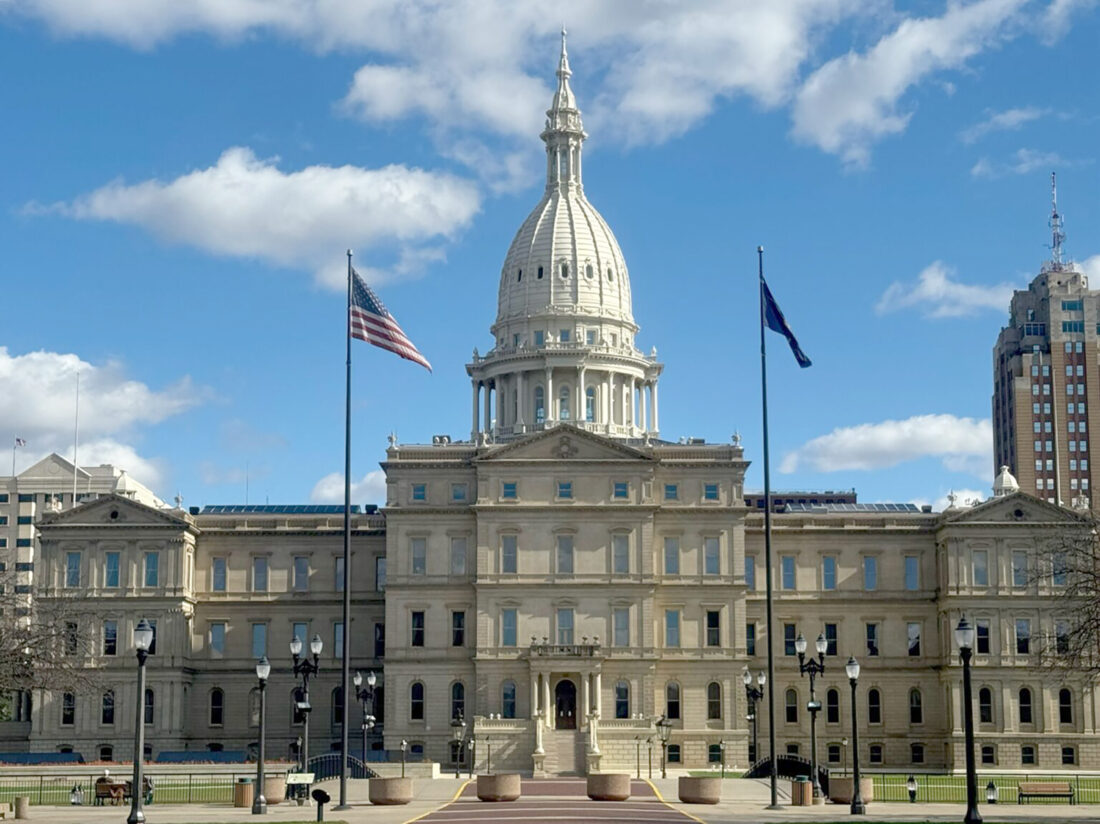Michigan K-12 budget heads to conference after Legislature action

The Michigan Capitol building in Lansing. (Susan J. Demas/Michigan Advance)
The Michigan Legislature, after going all night Tuesday to pass a continuation budget to avoid a government shutdown, spent Wednesday hashing out further details of the state’s K-12 schools budget for the current fiscal year.
A much-discussed deal on school funding still needs to be worked out in a joint House and Senate conference, but Republican lawmakers in the House gave reporters at least some indication Wednesday on what per-pupil funding might look like, as well as other areas of the full budget deal.
Schools are without state funding due to the long budget impasse that has yet to be fully resolved, despite the Republican-controlled House, the Democratic-led Senate and Gov. Gretchen Whitmer’s budget team coming to a final agreement on how to fund the government.
Lawmakers on Tuesday evening and Wednesday morning reached that deal but failed to get a budget in place before the new 2025-26 fiscal year, which began at 12:01 a.m.. A shutdown lasted for just one hour due to the respective sides agreeing to take up the House’s shutdown prevention plan passed in March.
Still, several school districts have said they were foregoing offering free school meals and have laid off staff in the wake of the uncertainty over the lack of funding from the state and when they might receive their first school aid payments, which typically go out in late October.
Whitmer and State Superintendent of Public Instruction Michael Rice urged schools to keep funding school meals because the money was coming, insinuating that free breakfast and lunch were going to be a big part of the final budget when it finally gets to the governor’s desk.
Both the House and Senate held session on Wednesday, in which the House took up the Senate’s education budget bill passed earlier this year – Senate Bill 166 – with a few changes. When it was kicked back to the Senate, the upper chamber rejected the House’s changes and sent the bill to the conference committee. That will give the committee a chance to hammer out further details.
State Rep. Ann Bollin, R-Brighton Township, chair of the House Appropriations Committee, told reporters after the House session that the deal on funding the whole of state government is pretty much settled, and the next step in the process was to sort out the school aid budget.
“The (education budget) bill continues to be written, and in the face of time, we had a … continuation. Both of these (government funding and education) bills will go to conference,” Bollin said.
A large unknown was how much per-pupil funding schools would receive in the final budget.
Bollin finally broke through the noise Wednesday and told reporters it would be record funding at $10,050 per student. The budget would also provide for school meals, potentially as its own line item – a win for the Senate and Democrats writ large who fought for that funding to remain in the budget.
Higher education will still be potentially funded by taking dollars away from the school aid fund that provides dollars to K-12 education, but Bollin said they were working to make the school aid fund whole. Additional funding for K-12 schools could come in the form of supplemental budgets passed later in the year or in the next session of the Legislature, which begins in January.
Bollin did say that universities would see increased funding across the board.
The House appropriations chair also said there will be money for northern Michigan emergency relief after the late season ice storm that rocked communities in the early spring, as well as support for public safety. The budget would also provide Medicaid funding, although the exact numbers have yet to be revealed.
On the total number of the state government budget, Bollin said it is likely closer to the House’s spending proposal of $78.5 billion than the Senate’s $86 billion plan.
Road funding is one of the biggest pieces of the budget, which has been said to be coming in at just under $2 billion, but it would also require new revenue. One area of funding that has drawn concern is a proposed wholesale 24% tax on marijuana products sold at dispensaries across Michigan. Industry leaders and consumers have expressed outright opposition to the new tax and have threatened lawsuits if it passes.
Lawmakers said they were working to reduce that number on Tuesday before much of the budget action occurred later in the evening. It’s unclear what progress has been made toward that goal, if any.
Bollin was asked if she was confident about the new tax passing in the respective chambers. She said she was confident, but it remains to be seen if the Senate has the votes to push it through.
The Senate is also now publicly posting its proposed earmarks online, a change of pace that the House instituted for this year’s cycle and made it a point to impress upon the Senate a necessity for reform in the process. The Senate budging on that was a part of the negotiating process and GOP leaders in the House marked that as a win.
A hearing is planned for noon today before the Senate Appropriations Committee. The joint legislative conference committee on the final budget deal is scheduled for 1:30 p.m. or whenever committees are given leave to meet today.
Bollin also discussed the continuation budget and what it meant for state workers.
“We don’t miss a beat, so the place we were at on 11:59 p.m. on Sept. 30, we were at the same place at 12:05 a.m. (Oct. 1),” Bollin said. “It will be seamless. Business will go on as usual for all state employees, and that also means for all our constituent taxpayers that are seeking out state services.”
———
Michigan Advance is part of States Newsroom, a national 501(c)(3) nonprofit. For more, go to https://michiganadvance.com.



